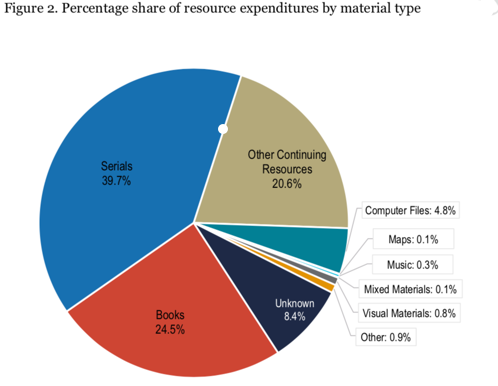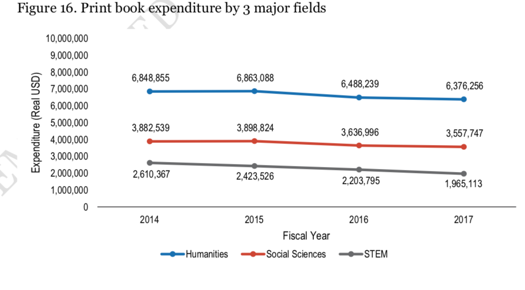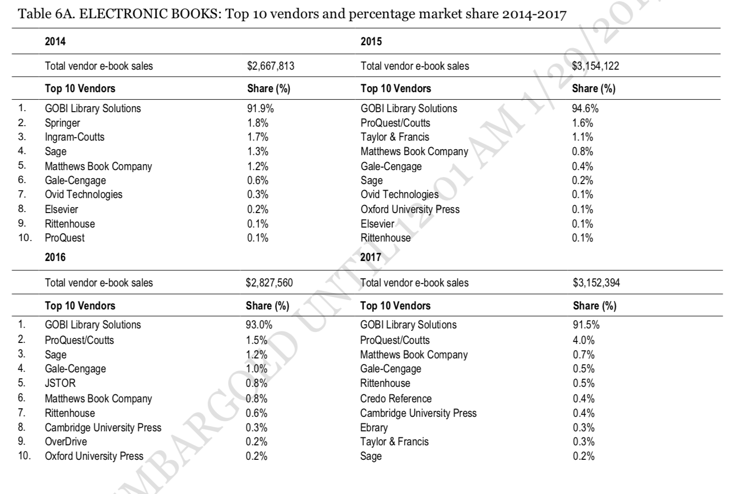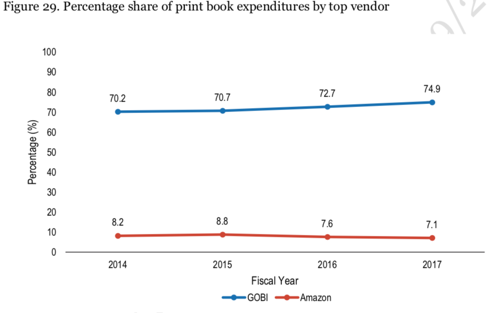Ithaka S+R Releases “Library Acquisition Patterns” Report
Library Acquisition Patterns from Ithaka S+R was written by:
From the Report:
The Library Acquisition Patterns (LAP) project was undertaken with the support of The Andrew W. Mellon Foundation with the aim of examining trends in US academic libraries’ book purchasing. The project utilizes data supplied by libraries that record their acquisitions in either Ex Libris’s integrated library system, Alma, or OCLC’s WorldShare Management Services (WMS). The sample of acquisition items is limited to print and electronic books acquired on a one-time, title-by-title basis within a specified price range to mitigate the inclusion of miscategorized items. This is in contrast to information materials acquired via subscription and/or grouped together within a package, which may also be important mechanisms for acquiring book content in many academic libraries.
The findings of this report consist of two distinct areas: 1) an analysis of library book acquisitions within the specified sample for fiscal year 2017 at 124 US academic institutions, and 2) a trend line analysis of print and e-books acquired within the specified sample, the university press presence in these libraries, and the leading vendors of books at 51 US academic institutions for fiscal years 2014 through 2017. While these samples are not representative, they afford a broader overview of the acquisitions patterns and practices of US academic libraries than we believe has ever been conducted to date.
Key Findings From Review of 2017 Acquisitions
- On average, the libraries in this study spent $3.61 million in 2017 and added 4,750 print books and 345 e-books acquired on a one-time, title-by-title basis within our sample
- Ongoing resource expenditures account for three-quarters of total materials expenditures, while only a fifth go toward one-time resource expenditures
- Serials and other continuing resources, which fall under ongoing resource expenditures, account for more than 60 percent of total materials expenditures; books, many of which are one-time resource expenditures, constitute 24.5 percent of materials expenditures
- Libraries spend 42.6 percent of their print book budgets on humanities titles. Forty-nine percent of books added by libraries to their collections were in the humanities
- Social science titles accounted for 32 percent of both the total e-book expenditures and the number of e-books obtained, making this field the largest for e-book acquisitions
- University presses held 23.6 percent of the print book market and 18.5 percent of the e- book market. Oxford and Cambridge unsurprisingly made up the largest share of the university press market
- The majority of university press book acquisitions are made through GOBI and Amazon The key findings for the 2014 to 2017 trend line analysis include:
- Library material expenditures increased in real terms, with more than 70 percent of expenditures going toward ongoing resources and between 16 and 21 percent going toward one-time resources
Key Findings the 2014 To 2017 Trend Line Analysis
- Library material expenditures increased in real terms, with more than 70 percent of expenditures going toward ongoing resources and between 16 and 21 percent going toward one-time resources
Expenditures made for print books obtained on a one-time, title-by-title basis decreased year to year, while e-book expenditures obtained in the same way experienced a net increase; however, within this sample of books, expenditures for these e-books were not increasing enough to offset the drop in spending on print books
- The average cost of an e-book in our sample rose by 35 percent between 2014 and 2017, while the cost of print books remained stable
- Print book expenditures in each disciplinary field declined, with humanities titles seeing the smallest drop and STEM the highest
- The social sciences accounted for the highest expenditures in any field for e-books, and e- book expenditures in the social sciences and humanities increased
- All degree-granting institutional types experienced a decline in their average print book expenditures, but have more varied spending on e-books. Only master’s degree-granting institutions saw a decline in e-book expenditures
- One-time expenditures for university press print books fell by 17.7 percent between 2014 and 2017. However, the proportion of university press titles being acquired compared to commercial press titles has remained relatively stable, with the former accounting for approximately 20 percent of one-time print book expenditures across all four years
- While expenditures for university press e-books saw wide fluctuations from year to year, there was effectively no net change in spending
- GOBI and Amazon were the leading vendors of print books in our sample, but libraries acquired print books from a variety of specialized vendors to meet their collection needs. GOBI was the leading vendor of e-books.
From the Conclusion
Ithaka S+R examined acquisitions at 124 US higher education institutions in fiscal year 2017 and 51 institutions with data on their acquisitions from FY 2014 to 2017.
The results show that while Amazon has become the second largest print book vendor to academic libraries, they actually are buying fewer books individually and below a certain price point, as measured by lower overall book expenditures within our sample. The slight increase in spending to acquire e-books is not high enough to offset the decline in spending to acquire print books. Nor does the increase in e-book expenditures necessarily mean that libraries are acquiring more books in digital format. Rather, e- books appear to be becoming more expensive (including e-books costing more than $350), making it costlier for libraries to acquire the same number of digital materials.
What do lower book expenditures overall mean for university presses? As predicted by others in the industry, only a fifth of library book expenditures are for university press titles. The academic library really is not the university press’s sole or even top customer, but the nearly 20 percent fall in spending for university press titles over the four-year period doesn’t bode well for the health of these presses, especially if they continue to rely on one-time print book sales as their main source of revenue. One positive is that the demand still exists for humanities and social science titles. Despite falling print expenditures for titles in these fields, libraries continued to spend relatively more on these fields than others, and for e-books, expenditures actually grew in these fields where they shrank in others.
Direct to Full Text Report: Library Acquisition Patterns
56 pages; PDF.
Filed under: Academic Libraries, Companies (Publishers/Vendors), Data Files, Funding, Libraries, Management and Leadership, News
About Gary Price
Gary Price (gprice@gmail.com) is a librarian, writer, consultant, and frequent conference speaker based in the Washington D.C. metro area. He earned his MLIS degree from Wayne State University in Detroit. Price has won several awards including the SLA Innovations in Technology Award and Alumnus of the Year from the Wayne St. University Library and Information Science Program. From 2006-2009 he was Director of Online Information Services at Ask.com.






